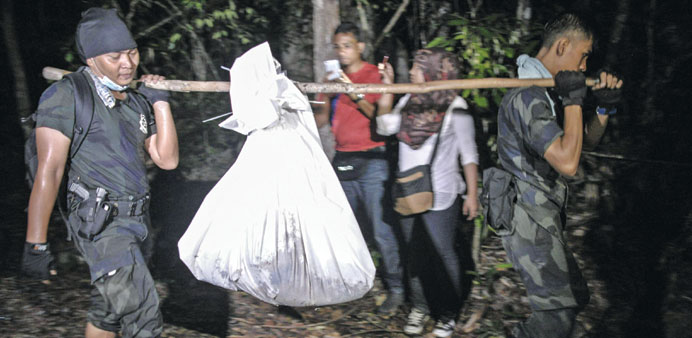Agencies/Kuala Lumpur
Two boats believed to be carrying more than 40 Rohingya refugees from Myanmar evaded Malaysian rescue forces yesterday, officials said as the international community prepared to step up efforts to save boat people in Southeast Asian waters.
The two boats, carrying more than 20 people each, were spotted by a Malaysian patrol near the resort island of Langkawi early yesterday but were in Thai territorial waters, said a senior Malaysian naval official.
“The orders are to search for them and provide humanitarian assistance. We are also prepared to bring them to land,” Roslee Mohamad Isa, acting commander of Malaysia’s northern region navy, told AFP.
“I have nine tons of food and clothing for the migrants who we believe are ethnic Rohingya. We want to save lives.”
Thailand is hosting a regional meeting today to tackle the crisis that has seen more than 3,500 Bangladeshi economic migrants and stateless Rohingya Muslims from Myanmar arrive on Thai, Malaysian and Indonesian soil.
Roslee said the two boats were spotted off Langkawi by a Malaysian warship but attempts to communicate with them failed as they turned back into Thai waters.
A total of six ships from the navy and coastguard along with a helicopter were deployed for the rescue operation on orders of prime minister Najib Razak.
Malaysia and Indonesia, under heavy international pressure, have agreed to allow boat people to land on their shores.
An AFP reporter on the KD Lekir, one of the six ships involved in the operations off Langkawi, saw officers closely scanning the nearby Thai islands for the two boats.
“We are patrolling over 50 nautical miles until Indonesian waters. I am not disappointed that we did not find the ships. What is important is we are ready to render humanitarian and medical assistance,” commander Zainol Ahmad told AFP.
Roslee said the migrant boats were playing a cat-and-mouse game because they want to enter Malaysia but do not want to be caught by the authorities.
“They want to come in and to join their friends and relatives here. We cannot allow that to happen. I think the operators of the migrant boats do not want to be caught also,” he said.
Boatloads of starving Rohingya and Bangladeshis have typically been found abandoned by their smuggling syndicates and left to fend for themselves.
Malaysia said yesterday it believes 139 bodies are buried in marked graves at remote camps used by people-smugglers on the Thai border, wrapped in white cloth after Muslim rites.
The abandoned sites were discovered on the weekend, escalating a crisis that erupted earlier this month when a Thai crackdown on trafficking networks left thousands of desperate people stranded at sea on rickety boats.
“Based on the size of the graves, and after the area was cleared... we have a clearer indication -- single grave, single person,” Deputy Home Minister Wan Junaidi Tuanku Jaafar said in the border town of Wang Kelian.
Malaysia previously said it had discovered 139 grave sites. When asked by AFP if he now believed there were 139 bodies in total, Wan Junaidi said: “Yes.”
Thai authorities acted after discovering some 33 bodies in mass graves in camps in the country’s south, exposing a deadly trade in Muslim Rohingya who are fleeing persecution in Myanmar, as well as Bangladeshis seeking better opportunities abroad.
“This is not only Malaysia’s problem, (it is) an international problem as people come from Bangladesh and Myanmar,” Wan Junaidi said.
“It is Asean’s problem,” he added, referring to the Southeast Asian grouping that includes Malaysia, Myanmar and Thailand.
The camps on Malaysia’s side of the border, which could have been capable of housing hundreds of people, drew allegations that authorities and residents had turned a blind eye to the lucrative business.
Wan Junaidi said initial investigations showed the bodies were wrapped in shrouds and their resting places marked with wooden sticks. Camphor was also found at the graves.
“It seems like proper burial, the bodies were wrapped in white cloth. It is like the Muslim burial... some are shallow graves, not all,” he told reporters.
Malaysian officials had repeatedly denied that such grisly sites existed despite warnings from activists.
Wan Junaidi said Malaysian security forces had not been patrolling the area because it was thought to be inaccessible.
Malaysian police commandos began surveying it after the discovery of the graves in Thailand, he said.
Because the site is so rugged, the bodies will likely be recovered from the Thai side, he added.
Since Thailand’s crackdown threw the smuggling routes into disarray, more than 3,500 starving migrants have arrived in Thai, Malaysian and Indonesia, and others are feared still trapped at sea.Relatively prosperous Malaysia, which has a Muslim majority, has long been a favoured destination for Rohingy
In an interview published yesterday, the Dalai Lama urged fellow Nobel peace laureate Aung San Suu Kyi to help the Rohingya.
“It’s very sad... I hope Aung San Suu Kyi, as a Nobel laureate, can do something,” the Tibetan Buddhist spiritual leader told The Australian newspaper.
The Dalai Lama said she must speak up, and that he had already appealed twice to her in person since 2012, when deadly sectarian violence in Myanmar’s Rakhine state pitted the Rohingya against local Buddhists.
Observers say the Myanmar opposition leader may be reticent about the Rohingya issue in order to avoid alienating voters among Myanmar’s Buddhist majority ahead of elections slated for November.
Wan Junaidi confirmed that Malaysian police are investigating 12 of their own officers over suspicion of involvement, with two “suspected of transporting the people (migrants)”.
“We are investigating Rohingya in Malaysia too,” he said.
The United States on Wednesday backed the investigation, calling for a “transparent, credible and expeditious effort” and urging authorities to prosecute those responsible.

Royal Malaysian Police carry exhumed human remains from the jungle in the Malaysian northern state of Perlis.
